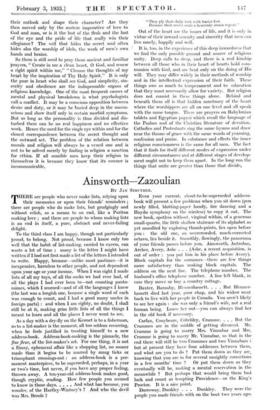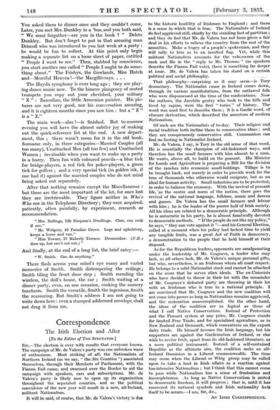Ainsworth—Zazoulian
BY JAN STRUTIIER.
THERE are people who never make lists, relying upon their memories or upon their friends' reminders ; there are people who do make lists, but grudgingly and without relish, as a means to an end, like a Puritan making love ; and there are people to whom making lists is an end in itself, a pure, abstract and never-failing delight.
To the third class I am happy, though not particularly proud, to belong. Not proud, because I know only too well that the habit of list-making, carried to excess, can waste a lot of time many is the letter I might have written if I had not first made a list of the letters I intended to write. Happy, because—unlike most pastimes—it is inexpensive, harmless to other people, and not dependent upon your age or your income. When I was eight I made lists of all my toys, of all the cooks we had ever had, of all the plays I had ever been to—not counting panto- Mimes, which I scorned—and of all the languages I knew (the last was a longish one, because a single word of each was enough to count, and I had a good many uncles in foreign parts) : and when I am eighty, no doubt, I shall still be at it, making grim little lists of all the things I meant to learn and all the places I never went to see.
As a day with a dry-fly on the Kennet is to a fisherman, so to a list-maker is the moment, all too seldom recurring, when he feels justified in treating himself to a new address-book. Address-book-making is the pinnacle, the fine fleur, of the list-maker's art. For one thing, it is not a flimsy, ephemeral affair like a shopping list, no sooner made than it begins to be marred by smug ticks or triumphant crossings-out : an address-book is a per- manent masterpiece, to be superseded, perhaps, in a year or two's time, but never, if you have any proper feeling, thrown away. A ten-year-old address-book makes good, though cryptic, reading. How few people you seemed
to know in those days And what has become, you wonder, of the Hartley-Wintney's 1 And who the devil Was Mrs. Broole Even your current, about-to-be-superseded address- book will present a few problems when you sit down (pen newly filled, blotting-paper handy, fire dancing and a Haydn symphony on the wireless) to copy it out. The new book, spotless without, virginal within, of a generous small-quarto, the little shallow staircase of its alphabet as yet unsullied by exploring thumb-prints, lies open before you : the old one, an overcrowded, much-corrected octavo, lies beside it. Smoothly, flowingly, the panorama of your friends passes before you. Ainsworth, Antrobus, Archer, Avery, Ashe . . . (Ashe, a recent acquisition, is out of order : you put him in his place before Avery). Block capitals for the surnames—there are few things more satisfactory than making block capitals. The address on the next line. The telephone number. The husband's office telephone number. A line left blank, in case they move or buy a country cottage.
Baxter, Barnaby, Blcnnerhassett. . . . But Blenner- hassett died last year, poor chap, and his widow went back to live with her people in Canada. You aren't likely to see her again : she was only a friend's wife, not a real human being. Leave her out—you can always find her in the old book if necessary.
Carfax, Conybeare, Critchley, Crumme. . . But the Crummes are in the middle of getting divorced. Mr. Crumme is going to marry Mrs. Vinnabar and Mrs, Crumme is going to marry Mr. Vinnabar, so that in the end there will still be two Crummes and two Vinnabars ; but at present they have four addresses between them, and what are you to do ? Put them down as they arc, knowing that you are in for several unsightly corrections in a few months' time ? Or put them down as they eventually will be, making a mental reservation in the meanwhile But perhaps that would bring them bad luck and count as tempting Providence—or the King's Proctor. It is a nice point.
Darroway, Dunkley . . . Dunkley. They were the people you made friends with on the boat two years ago.
You asked them to dinner once and they couldn't come, Later, you met Mrs. Dunkley in a 'bus, and you both said, " We must forgather—are you in the book ? " Delete Dunkley. But don't forget to put in that amusing man Driscoll who was introduced to you last week at a party he would be fun to collect. At this point only begin making a separate list on a loose sheet of paper, entitled " People I want to see." Then, stabbed by conscience, you start another one called " People I ought to do some- thing about." The Frisbys, the Gowlands, Miss Hatch and—Merciful Heaven I—the Macgillivrays. . . .
The Haydn symphony is over long ago ; they are play- ing dance music now. To the bizarre plangency of muted trumpets you copy out your cherished, your solitary " Z " : Zazoulian, the little Armenian painter. His pic- tures are not very good, nor his conversation amusing, and it is eighteen months since you saw him : but a " Z " is a " Z."
The main work—alas i—is finished. But to-morrow evening you will have the almost subtler joy of making out the quick-reference list at the end. A new depart- ment, this ; there wasn't room for it in the old book. Surname only, in three categories—Married Couples (all too many), Unattached Men (all too few) and Unattached Women ; invaluable when you want to make up a party in a hurry. Then fun with coloured pencils—a blue tick for bridge-players, a red tick for poker-players, a green tick for golfers ; and a very special tick (in golden ink, if one had it) against the married couples who do not mind being asked out separately.
After that nothing remains except the Miscellaneous : but these are the most important of the lot, for once lost they are irretrievable. They figure neither in Who's Who nor in the Telephone Directory ; they were acquired. patiently, often painfully, by experiment, research or recommendation.
" Mrs. Dollings, 3-1k Simpson's Dwellings. Char, can cook if nec."
" Mr. Widgery, 49 Paradise Grove. Logs and upholstery, keeps a horse and van."
" Miss Towser, 37 Maberly Terrace. Dressmaker. (N.B. does up, but can't cut out.) "
And finally, at the end of a long list, the brief entry
W. Smith. Can do anything."
There flash across your mind's eye many and varied memories of Smith. Smith distempering the ceilings ; Smith tiling the front door step ; Smith mending the wireless, the doll's house, the car ; Smith waiting at a dinner party, even, on one occasion, cooking the nursery luncheon. Smith the versatile, Smith the ingenious, Smith the reassuring. But Smith's address I am not going to write down here : even a stamped addressed envelope_ shall not drag it from me.





































 Previous page
Previous page